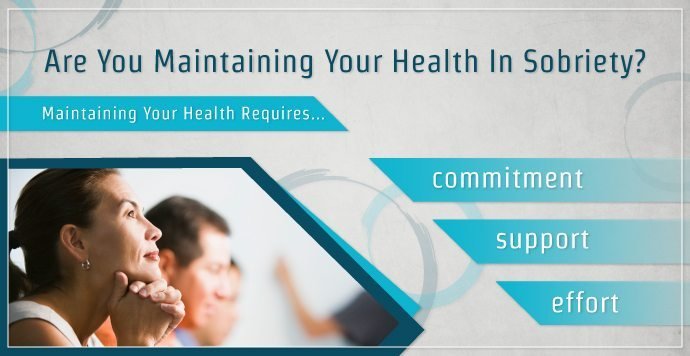Are You Maintaining Your Health in Sobriety?

I always wanted to have a remote control toy airplane as a kid. I wanted it to be the kind that had a gas engine, not the cheap plastic toys available back in the early 80s. No, none of that cheap RadioShack stuff for me. It had to be the kind that you build from the ground up. Real wood. Real controls. Real skin you had to apply yourself to the plane’s wings.
I begged my dad to get me one for months.
“You realize what a commitment a project like that is, don’t you?” he said.
“What do you mean?” I asked.
“A model airplane is a big project. It takes a commitment.”
“O yeah, Dad. I’ll work on it. I swear.”
So my father relented. One day he came home with a big cardboard box with a photo of a kid with a toothy grin in the far background. The kid held a remote control transmitter; he looked like he was having the time of his life. In the foreground of the picture flew a buzzing, swooshing, wooden model airplane high in the sky. It donned bright, red stripes on its wings. I can still see the photo on the box today when I close my eyes.
The next weekend, my dad and I opened up the box to discover the thousand or so balsa wood pieces. Accompanying the mish-mash of parts were hundreds of pages of assembly instructions in a book.
Again, my father asked me: “Are you sure you wanna do this?”
“Oh yeah. Absolutely.”
The first weekend, we managed to put together one main wing—just the structure.
The next, we had somewhere to go, so I skipped working on it. And the weekend after that, I decided it was more important to sleep in.
My Dad grew tired of helping me very quickly, maybe because he was too busy, or because he thought I could do it myself. He did manage to ask me how the project was coming along though.
The kit sat in the basement for months. I’d look at it now and then, and say to myself: Yeah. I’ll complete it. Eventually.
I never did complete that model airplane. I don’t know what even happened to it. Probably my mother got sick of seeing it in its unfinished state and threw it out.
People don’t like to stick to doing things, or creating healthy habits—including those in recovery.
Much like the unfinished model airplane sitting in the basement from my childhood, people attempting to find recovery will inevitably experience burnout trying to stay sober. Maintaining your health requires a commitment and that kind of commitment won’t seem as “fun” as getting high or drunk.
Regardless your stance on the disease model of addiction, this much is clear: maintaining your health takes commitment, effort, and support. No person is an island and “going it alone” usually isn’t an effective strategy.
Fortunately, we live in a time when options abound. We not only have at our disposal considerably more medical and scientific understanding of the roots of addiction, but plenty of choices with different modalities of support groups and therapeutic treatment strategies to maintain our health.
Individual Therapy
In my own maintenance regimen, I attend two to three Twelve Step groups per week. However, when I first began to establish a pattern of long-term recovery for a new life, I attended individual therapy. I found it invaluable to self-discovery.
Individual therapy can include therapeutic models such as motivational interviewing, cognitive behavioral therapy (or CBT), dialectical behavior therapy (or DBT), and/or relapse prevention training (RPT) to effect a long-term change from the harmful behaviors.
Individual therapy has the advantage of working directly with an expert to dig deeply at the issues which caused you to drink or use in the first place. Often, individual therapy is mandatory within a treatment setting.
Its drawback is that individual therapy alone often tends to be very “me” centered. A therapist or counselor only can guide you so far. People in recovery may also associate the therapist, psychologist, or counselor as a savior figure, when that is not their purpose. The professional is a guide and you still have to do the heavy lifting of change. And change is never easy.
Support Group Therapy
Support (or peer) group therapy is a powerful asset to maintaining your health.
The most common support group therapy is the Twelve Step model, which has a long history. The Twelve Step model has its roots most famously within such groups as Alcoholics Anonymous and Narcotics Anonymous. In fact, the Twelve Step model has been so popular that the model has multiplied into a veritable cornucopia of different groups focusing on a myriad of problems.
 Not everyone will feel comfortable in a Twelve Step group. I know I didn’t at first. The focus on a “spiritual solution” seems to clash with many people’s concept that addiction is a medical condition. And you don’t treat medical conditions with spirituality.
Not everyone will feel comfortable in a Twelve Step group. I know I didn’t at first. The focus on a “spiritual solution” seems to clash with many people’s concept that addiction is a medical condition. And you don’t treat medical conditions with spirituality.
However, many hundreds of thousands (if not millions) of people throughout the world regularly attend such groups and find meaning and a beneficial strategy within them.
Another group therapy that is gaining popularity is the Rational Recovery movement. As an alternative to the spiritual approach of Twelve Step groups, Rational Recovery focuses on learning to recognize addictive behaviors for what they are—destructive, family-wrecking behemoths. Such groups use what they name as Addictive Voice Recognition Technique® as an alternative method to addressing addiction.
One other option (there are a few others) is Family Therapy. Family Therapy generally has a trained therapist sitting in the sessions to guide the process. Its focus is to deal with the interwoven and often complex relationships of a patient’s family. Sometimes, peers are included. Like Rational Recovery (and unlike Twelve Step models) Family Therapy is evidence-based. Many people have managed to rebuild their lives with this type of group therapy.
Medical Interventions
The science behind addiction has advanced considerably in the past two decades. Treatment regimens with medications have grown popular.
Naltrexone is used successfully to treat both narcotic- and alcohol-dependent individuals. The drug will be used after a patient has fully withdrawn from opiate dependency. For alcoholics, it addresses the urge to drink. It is not habit forming and has been in the arsenal of medications for addiction for over thirty years now.
 Acamprosate has been around for a little over ten years in the United States. Like other medications, it is not a cure for alcoholism, but a tool to help maintain sobriety.
Acamprosate has been around for a little over ten years in the United States. Like other medications, it is not a cure for alcoholism, but a tool to help maintain sobriety.
Antidepressant medications have also a track record to helping maintain a person’s health. Much of the reason why I drank and used drugs had to do with an avoidance of the depressive state my brain naturally gravitates toward.
A Multipronged Approach
One last approach that is worth mentioning is the use of several approaches at once to address the problem of addiction. In fact, studies have shown greater efficacy in maintaining sobriety when two or more approaches are used versus only one.
Whatever approach you use to maintain your health, one fact is clear: you’ve made the best decision of your life. Your health and your well being in the long term are worth it. I know it was for me.
Like the commitment I now have to my health, maybe I’ll go out one day and buy a remote control plane for one of my boys to play with after we commit to finishing that project.
 Daniel D. Maurer is a freelance writer openly living in long-term recovery. He is the author of Sobriety: A Graphic Novel, a Hazelden Publishing, youth and young adult resource. Daniel is currently working on his fourth book, which covers the topic of resiliency. He lives with his family in Saint Paul, Minnesota.
Daniel D. Maurer is a freelance writer openly living in long-term recovery. He is the author of Sobriety: A Graphic Novel, a Hazelden Publishing, youth and young adult resource. Daniel is currently working on his fourth book, which covers the topic of resiliency. He lives with his family in Saint Paul, Minnesota.




